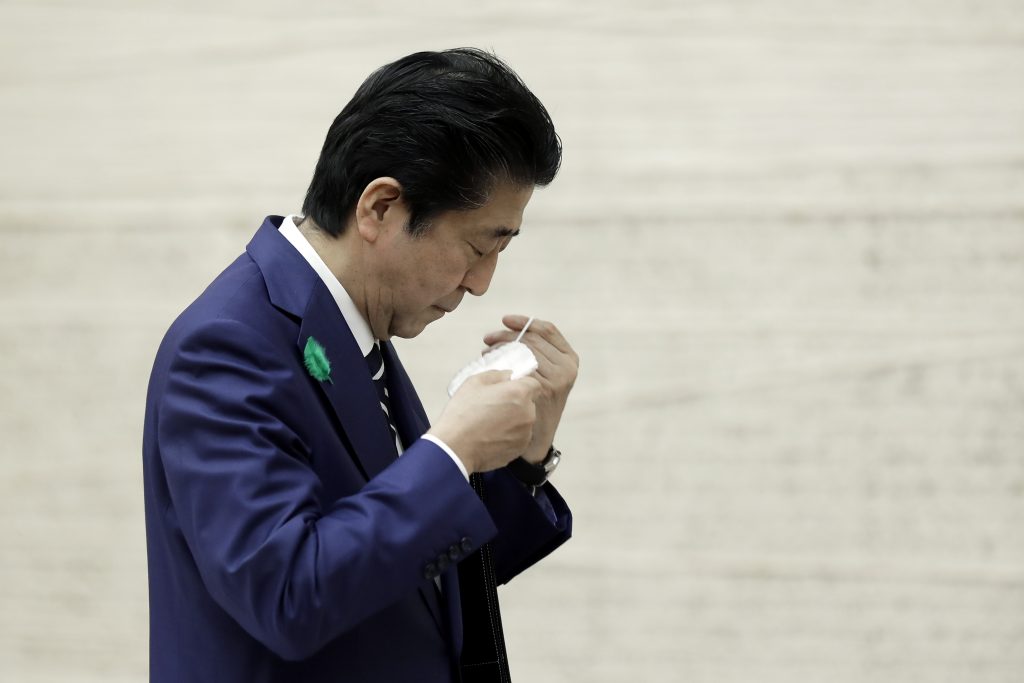
- ARAB NEWS
- 01 Aug 2025

TOKYO: The Japanese government Monday extended its nationwide state of emergency over the coronavirus through May 31 in the fight against the virus that causes the COVID-19 respiratory disease.
At a press conference, Prime Minister Shinzo Abe called for people's understanding and cooperation while apologizing for the extension, saying, "I'm acutely aware of the responsibility I have."
The government is considering lifting the state of emergency partially if possible before May 31 depending on results of an interim assessment by experts of the spread of the virus and medical care situations expected to take place on May 14.
"If found appropriate, the state of emergency will be lifted without waiting for its expiration," Abe said at a meeting of the government's coronavirus response headquarters.
Abe said stay-at-home and business shutdown requests should be kept in place in the 13 prefectures placed on special coronavirus alert.
The government said the restrictions should remain in place in these prefectures to reduce social interactions by 80 pct and the number of commuting workers by 70 pct.
But the government said it may be possible to reopen museums, libraries and outdoor parks with infection prevention measures in place from the standpoint of maintaining healthy life.
The list of prefectures with special alert status was once under review for a possible change but it was eventually left unchanged.
For the remaining 34 prefectures, Abe sought to lift or ease the restrictions, saying, "There will be a gradual shift" to efforts to balance virus containment measures with action to maintain social and economic activity.
Specifically, the government allowed the reopening of restaurants and theaters with no clusters of infection as well as the holding of events with a relatively small number of participants.
At the press conference, Abe said, "The rate of decrease in the number of new coronavirus cases is not sufficient." He sought to reduce the daily number of new cases below 100.
The prime minister called for people's long-term efforts to contain the virus. "May is a preparatory period toward a next step. We need to build a new everyday life for the times of the coronavirus as soon as possible," he said.
The government called on people across the country to continue avoiding trips across prefectural borders, large-scale events and the use of eating and drinking places with in-person services in busy shopping districts.
For schools, the government said that an environment should be created to open the way for resuming school education gradually depending on the situation of each region.
The government extended the coronavirus emergency after obtaining approval from experts and giving prior briefing to lawmakers.
In the briefing, economic and fiscal policy minister Yasutoshi Nishimura said the list of prefectures with special alert status could see additions depending on results of the interim assessment.
The state of emergency was set to expire on Wednesday. The government declared the emergency on April 7 initially for Tokyo and six other prefectures and expanded it to the whole country nine days later.
A panel of experts commissioned by the government said that restrictions can be eased in areas with a limited number of new infections but said a shift to a new lifestyle is needed there to prepare for a prolonged fight against the virus.
As examples of the new lifestyle, the panel cited the increased use of online shopping and electronic payments and food takeout and delivery services.
The examples also included the greater utilization of teleworking and staggered work shifts.
Shigeru Omi, vice chair of the panel, told a press conference that people should keep distance with others, wash hands and wear face masks. "These three principles should be observed during everyday life," he said.
The panel also called for increased coronavirus testing, saying that the number of testing per 100,000 people is smaller in Japan than in foreign countries.
JIJI Press